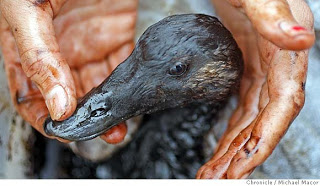Here’s a rule of thumb: if something is so toxic that birds die when they land on it, it’s probably a good idea to put a cover on it.
In Texas yesterday, a federal district court upheld a criminal conviction against the oil refinery giant Citgo Petroleum after migratory birds landed in two open-top refinery tanks and died. Under Environmental Protection Agency (EPA) rules and Texas law such tanks are supposed to be covered. The court found that the company had known birds were landing and dying in their tanks but failed to do anything about it.
Citgo faces some $2 million in fines. A too small price to pay I think for their negligent behavior.
In Canada’s tar sands, similar cases of migratory bird deaths have been ruled very differently. Many will remember the story in 2008 when 1600 ducks landed on the massive lakes of tar sands toxic by-products and died.
Here’s a news report at the time of the deaths:
Syncrude, the tar sands giant responsible for the deaths, was ordered to pay $3m in fines.
But the deaths continued again in 2010 when more than 500 ducks caught in a winter storm sought refuge on what they thought were fresh water ponds. Those “ponds” turned out to be toxic lakes of sludge courtesy of Syncrude and Suncor. The ducks, covered in oily sludge, had to be put down.
In early October this year the Alberta government announced there will be no charges laid against Syncrude or Suncor because it was the winter storm that caused the ducks to land and there was nothing the companies could have done to prevent the deaths.
Unlike Citgo, whose relatively small oil refinery tanks can easily be covered with nets, the toxic lakes in Northern Alberta that store all of the sludgy byproducts of tar sands operations are so large they can be seen from space and thus impossible to cover and protect from birds.
So this tragedy has no end. As tar sands production increases, the size of these toxic lakes will increase and the birds that have flown this same migratory path for millions of years will continue to die.
Subscribe to our newsletter
Stay up to date with DeSmog news and alerts







